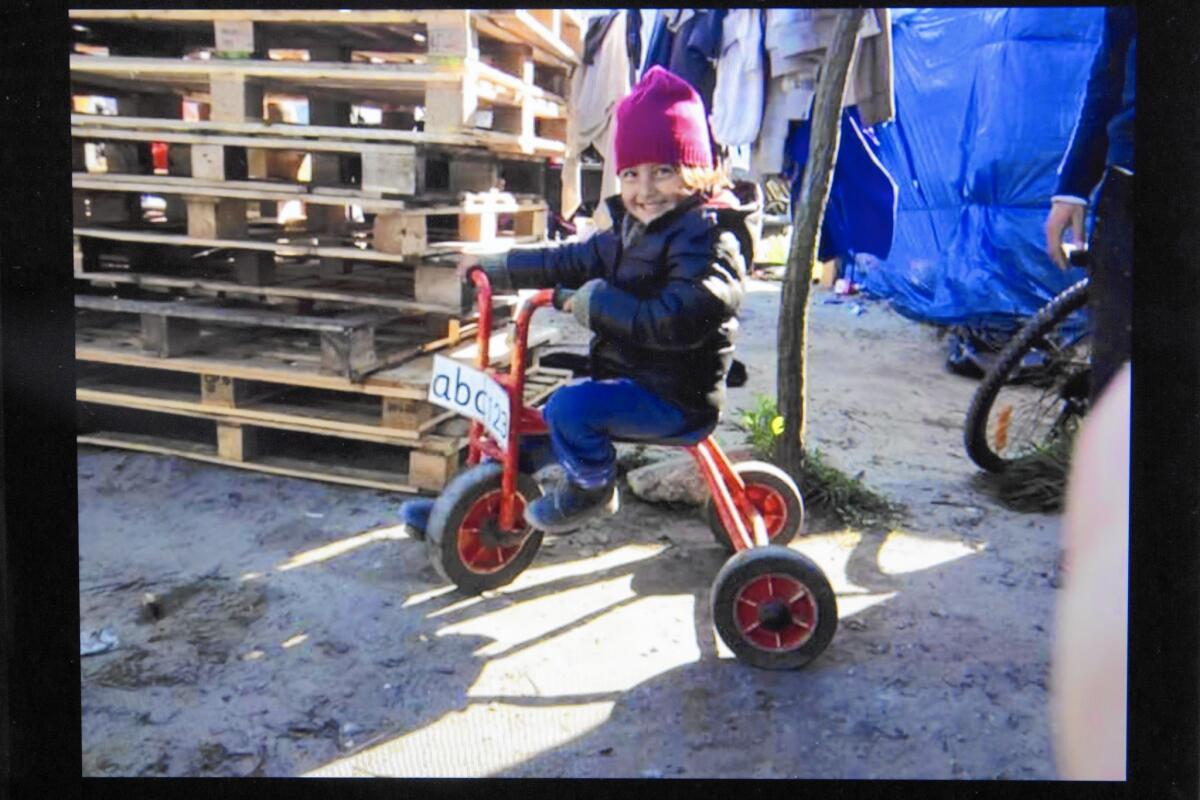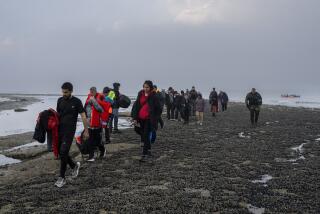British man who sneaked girl out of refugee camp gets plenty of sympathy

- Share via
reporting from Paris — The image of a dead Syrian toddler washed up on a beach last year stirred worldwide outrage over a growing refugee crisis.
Rob Lawrie decided to do something about it. The British former soldier closed down his cleaning business, bought a van and started delivering tents, clothing and food across the English Channel to the Jungle, a refugee shantytown of more than 4,000 people near the French port city of Calais.
He now says his compassion got the better of him.
In a case that has elicited broad public support for Lawrie, he was set to go on trial Thursday in France on suspicion of trying to smuggle a 4-year-old girl out of the Jungle and into England.
“I’m not a smuggler,” he told Le Monde newspaper in December. “No money changed hands. It wasn’t even a premeditated act. I did it on a sudden feeling.”
His French lawyer, Lucile Abassade, said Lawrie intends to plead guilty to the charge — aiding illegal immigration — but argue that breaking the law was a humanitarian act. He faces up to five years in prison and a $41,300 fine if convicted by the court in the coastal town of Boulogne-sur-Mer.
Lawrie’s version of events goes like this: After he started volunteering in the shantytown, the girl, a refugee from Afghanistan named Bahar Ahmadi, began following him everywhere. Everybody called her by her nickname, Bru. Her father, Reza Ahmadi, whose wife had been killed back home, begged him many times to take her to Leeds in the north of England, where several cousins had settled legally. Lawrie refused.
But one night last October, he cracked in a “moment of madness,” 49-year-old Lawrie told journalists.
He was preparing to leave France when British border police found two migrants from Eritrea in the back of his van.
Lawrie insisted that the men had stowed away without his knowledge. When French police handcuffed him, he told them they had missed Bru, who was apparently in a storage compartment.
Lawrie was not charged in relation to the Eritreans, only the girl.
“I just couldn’t leave her to spend one more night in that horrendous place,” Lawrie told a British newspaper. “And when you have seen what I have seen all rational thought goes out of your head.”
He elaborated in an interview with Al Jazeera: “We cannot help everyone, but everyone can help someone and she had become my someone. I just did it because I could no longer see her live in this squalid environment.
“She’s a special little girl and in all the months that I spent with her, I never saw her without a smile,” he added.
Lawrie, who served for seven years as a physical training instructor with the Royal Corps of Transport, also said that he regretted his actions. After his arrest, his second marriage broke up, and his wife took their two children, he said.
His lawyer said he plans to argue that to have ignored the appeal by the girl’s father would have flouted a French law requiring people to give assistance to someone in danger.
In a show of support for Lawrie, about 53,000 people signed a petition asking British authorities to help spare him from jail.
“Rob shouldn’t be treated as a criminal, but as an ordinary man ... trying to do the right thing in extraordinary circumstances,” wrote the petition organizer, Jim Innes.
A French petition on www.change.org has nearly 120,000 signatures, and backers are being encouraged to demonstrate their support outside the courtroom.
Refugees and migrants who gather on France’s northwestern coast in hopes of making it across the channel to Britain have been a source of tension between the two countries for at least 15 years.
The shanty dwellers near Calais are part of the recent crisis in which hundreds of thousands of people have arrived across Europe after being displaced from Syria, Afghanistan, Somalia, Eritrea and elsewhere.
Though they could claim asylum in France, many prefer to take their chances with smugglers or stowaway on lorries and vehicles to make the crossing to Britain.
Over the years, as the authorities on each side of the channel have tightened checks and controls, the crossing attempts have become increasingly desperate and occasionally fatal. Last summer thousands of migrants stormed the entrance to the Channel Tunnel and clashed with police trying to contain them.
The Calais port is now heavily guarded by police and protected by high fences topped with razor wire and closed-circuit television cameras.
Each month an average of 3,600 people are caught trying to cross illegally, and last year at least 12 people died during such attempts. Nobody knows how many refugees make it.
Willsher is a special correspondent. Special correspondent Christina Boyle in London contributed to this report.
ALSO
California winner will have to share $1.5-billion Powerball jackpot
Another rare, venomous sea serpent washes ashore in Southern California
More to Read
Sign up for Essential California
The most important California stories and recommendations in your inbox every morning.
You may occasionally receive promotional content from the Los Angeles Times.













